The industry of ordering things and having them delivered to your house or workplace has been growing for some time, and its expansion has been boosted during times of crisis and epidemic. Technology has come a long way, which is good for both restaurants and services that deliver meals. Because of this technological breakthrough, food delivery apps are a lifesaver for consumers, and the food business is booming significantly.
Various studies have found that between 60 and 85 % of mobile users prefer using mobile applications. Even though it costs more to make than a website, a food-ordering app is a great investment. But nothing else comes close to the benefits and unique features that mobile apps offer.
Why are food delivery apps profitable?
Businesses in the dawning digital era are becoming digital, streamlining processes, and saving customers time and effort. People nowadays are so pressed for time that they want answers to their questions quickly and affordably right outside their front door.
This is a great environment for on-demand mobile applications to thrive in because of how convenient they are. Everything from taxis to movie tickets to food to hotel rooms can be acquired with the swipe of a finger on your smartphone. It’s for this reason that all businesses are investing heavily in creating apps for mobile devices.
In 2022, the total value of the online food delivery market is projected to reach $130.2 billion USD worldwide. Estimates for 2027 put this number at $223.7 billion USD. Over the time frame under consideration, analysts forecasted the market to expand by 11.44 percent CAGR.
Statista
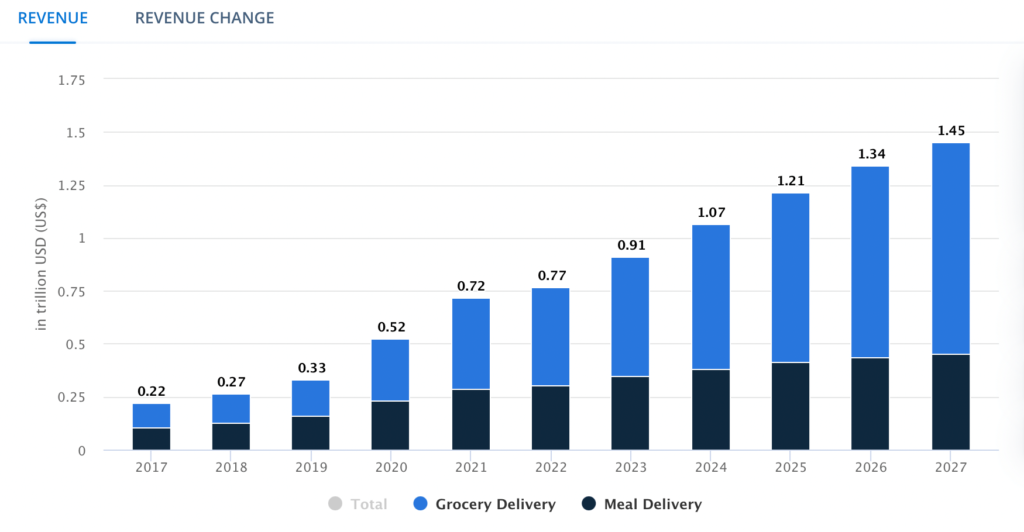
Grocery and meal delivery market revenue estimation from 2022 to 2027
Grocery delivery and food delivery services have merged to form the online food delivery market. As a result of the COVID-19 pandemic, the market saw significant growth. This expansion is visible in essentially all industries. It’s no surprise that well-established food aggregators like Just Eat Takeaway and Delivery Hero are expanding into the grocery delivery market.
08 essential features of food delivery apps
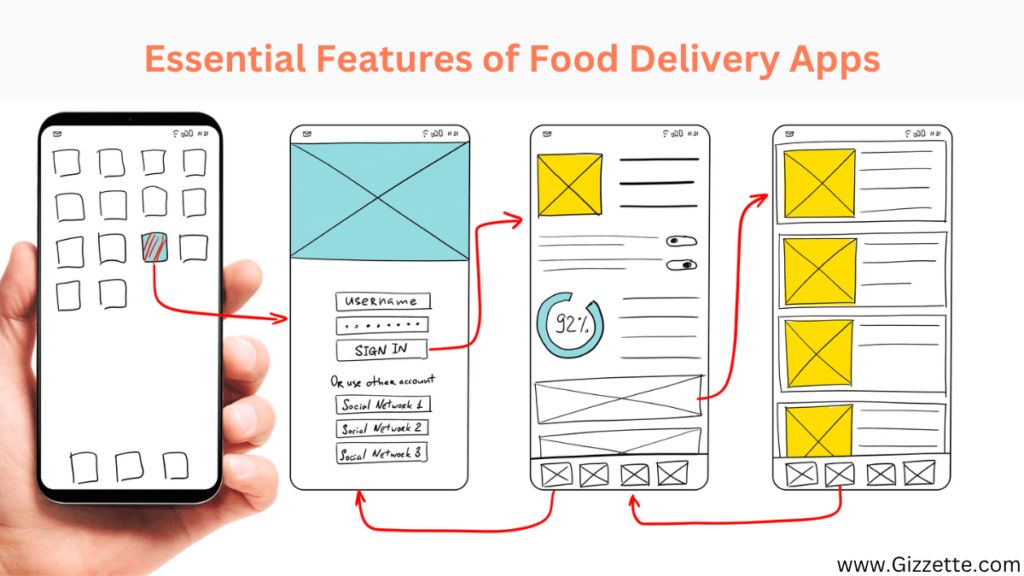
To build a top-notch app for your restaurant, you need to be familiar with the standard features of a similar on-demand service. These are the 08 most important aspects of a food delivery app.
1- Visible menu
Even though the menu is probably already on the restaurant’s website, the owners should make sure it is easy to find and easy to see in the app. Customers usually use mobile delivery apps to place orders, so it makes sense that they would want to quickly look at the menu before placing an order.
2- Offer Mobile Delivery/Takeaway Ordering
It is common practice for certain restaurants to use their apps primarily as a digital menu, alongside basic business details like address, hours of operation, phone number, etc. Customers may check out the menu on the go with the app and place an order by simply calling the number displayed. Although this is helpful, a simple webpage can achieve the same results. You should instead think about adding a mobile ordering feature to the app so that users can place orders or even make reservations quickly and easily.
3- Use Location-aware notifications to engage customers.
Using location services, a restaurant’s mobile delivery app can send out mobile ads that are more relevant to the user’s location. Restaurants can take advantage of location-based services by sending out geo-located notifications to customers about discounts, menu updates, order-ahead options, and requests for feedback after a customer has dined there. The options are limitless.
Mobile apps aware of their users’ locations can use geofencing to send messages to only the people in a certain area at a specific time who satisfy your criteria.
4- Real-time delivery tracking in-app
Installing GPS tracking systems in all of your mobile app delivery operations will give you real-time data on your delivery fleet, which will help you serve your customers better.
With the latest update to your restaurant’s POS system, including the order tracking system. When a customer places an order with a restaurant, this function will keep tabs on it, letting them know when it was placed, how long it has been being prepared, what color it is, and a number of other useful tidbits of information.
5- Use of “Push” Notifications
You can either make or break your app with push notifications. The key to the success of your app is to employ it in a way that is both classy and unobtrusive. User retention is increased with push notifications. Not only do they promote engagement with the message’s subject matter, but they also have the potential to boost your app’s financial returns.
Moreover, location-based push notifications let users know about deals and sales that are only available in their area. It’s true that push notifications may either make or kill your app. If you use the app tastefully and subtly, you will see positive results.
6- Money Transfer system in delivery apps
Mobile delivery apps for restaurants simplify and speed up the payment procedure for customers. Users can now make purchases from any Internet-connected mobile device, at any time, in any location. For this reason, programmers will have to create a mobile app that can handle financial transactions digitally.
In-app purchases, mobile banking, virtual marketplace apps like the Amazon mobile app, and digital wallets like Apple Pay, Android Pay, and Samsung Pay are all good examples of m-commerce. Shoppers want quick, convenient trips to the store.
7- Enhanced user experience
Web consumers generally feel that many sites present too much information in an unorganized layout. This is very important for apps that let people order food, where they can choose from pictures of many different dishes. Mobile apps are typically shorter yet have an extremely clean and simple design. In addition, their aesthetic value is high.
8- Customer Discounts & Special Offers
Discount offer apps, like the ones already mentioned, make it simple for customers to take advantage of the many restaurants’ discount offerings and eat out at a low cost. One such app, Panda, partners with nearby restaurants to promote repeat customers through the distribution of coupons and special offers on a variety of menu items.
Ideate the Best App for Delivering Food
As a business owner, you need to think about a few things while deciding on a delivery service.
You should prepare for the variety of business competitors that will be present in the delivery app’s marketplace. The widespread availability of enterprise-level apps and the resulting increase in potential consumers is great for the business overall, but it also raises the bar for competitiveness among restaurants.
As an added bonus, several delivery systems allow restaurants to tap into their pool of drivers. But in order to pay their drivers, some of these companies want a cut of each order. An alternative that doesn’t involve commission is software that lets restaurants employ and manage their own delivery drivers.
In summary, delivery apps have both advantages and disadvantages. By figuring out what features are most important to you in a delivery app, you can narrow down your choices to those that will work in your area, within your budget, and with your business model.
Final Thought
Many customers all across the world have started using food delivery apps because of how quickly they can get their food. Due to the stagnant economy and the pressure to meet work deadlines, food delivery apps have become the most convenient way to order from restaurants. At some point in the future, you should definitely try out some mobile tech if you haven’t already.

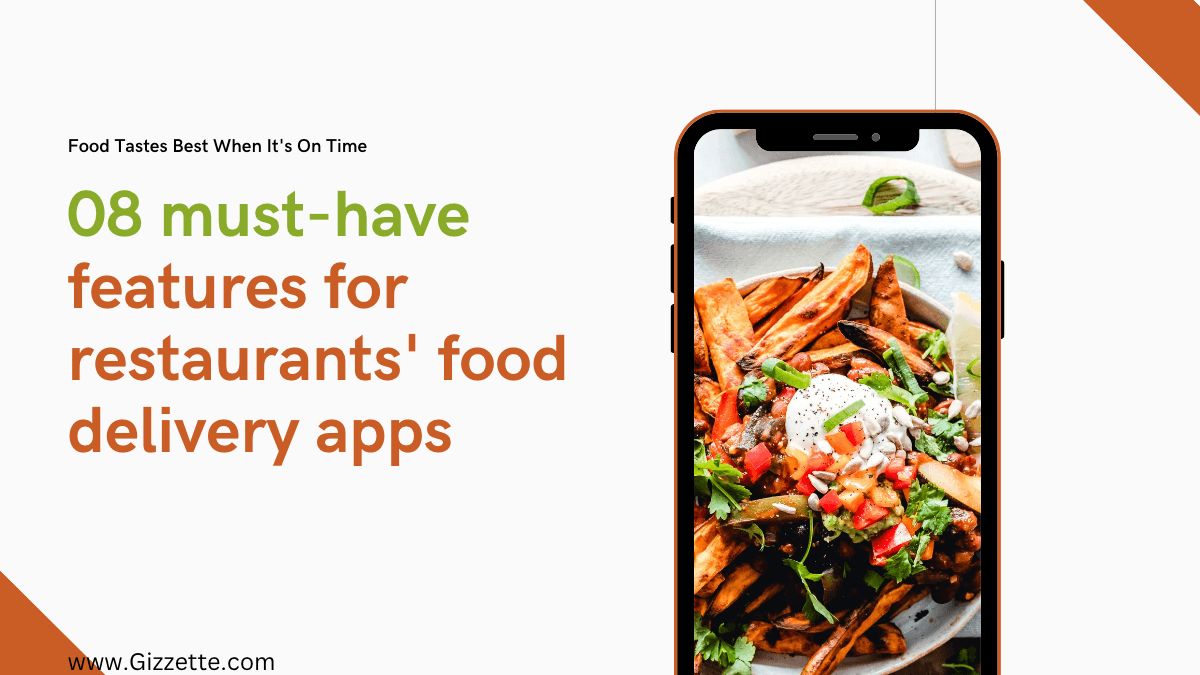



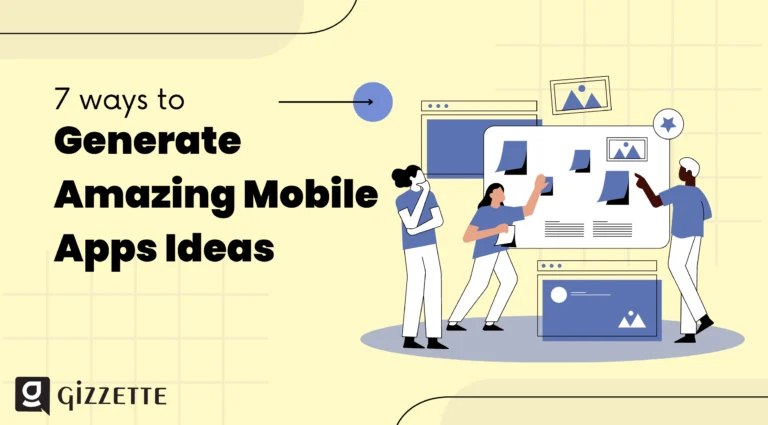

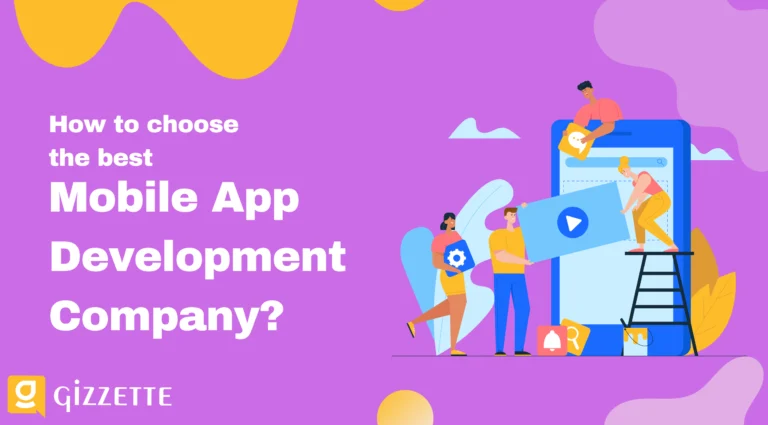
Leave a Comment